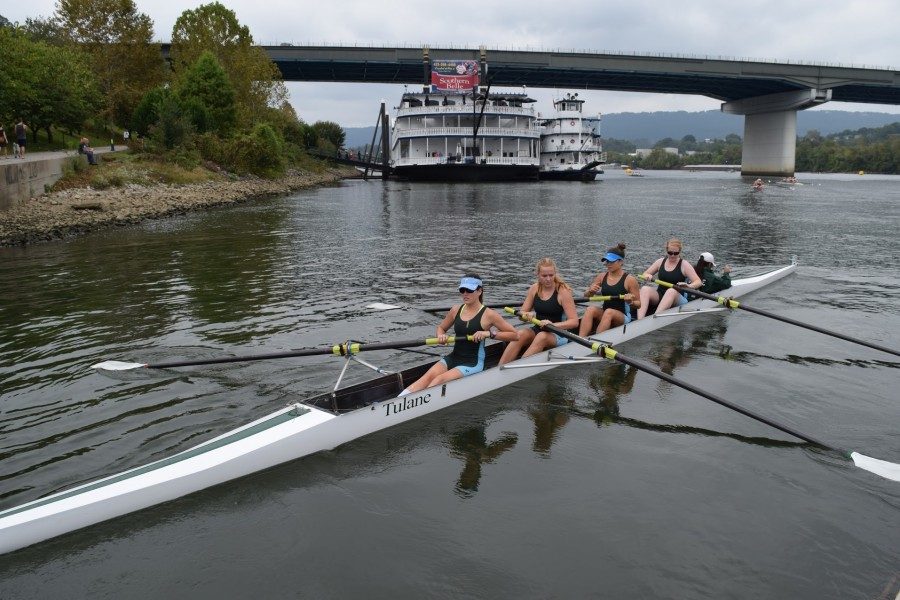Row Wave: Tulane Rowing competes at Chattanooga Head Race
Courtesy of Tulane University Rowing Association
The Women’s Collegiate 4+ rows at the Chattanooga Head Race last weekend. The team came in 10th.
After weeks of early morning practices and rowing on Lake Ponchartrain in the dark, the Tulane Rowing Association brought six boats up to compete in the Chattanooga Head Race last weekend.
The Men’s Collegiate 4+ placed fifth, the Men’s Collegiate Novice 8+ placed fifth, the Men’s Collegiate 8+ placed ninth, the Women’s Collegiate 4+ placed 10th, the Women’s Collegiate Novice 8+ came in eighth and the Mixed Collegiate 8+ came in second in their respective races.
For many of the crew members, rowing is an entirely new experience.
“I played basketball, lacrosse, tennis and ran track at various stages throughout high school, but I never touched an oar until I got to college,” men’s team captain Theo Coutsouros said. “… I signed up at the beginning of freshman year, and I’ve had a great time rowing ever since.”
The crew team spends nearly every morning together, meeting at Bruff Commons before sunrise to squeeze in a practice on the water before morning classes.
“A typical rowing practice begins with a 4:50 a.m. alarm,” Grant Wilson, president of the Rowing Association, said. “… At 5:25 a.m. the captains will start calling anyone who has yet to show up to meet in front of Bruff to make sure they’re both awake and on their way — anyone who isn’t awake is met within the next 10 minutes by a squad of other rowers at their door, likely knocking very loudly. By 5:50 a.m. we arrive at the boathouse just off of Lake Pontchartrain and start bringing oars and boats down to the dock so that we can be on the water by 6 a.m. The next hour and a half are spent on the water rowing through the darkness and skillfully dodging any barges out on a morning stroll.”
When they’re not on the water, the team members sequester themselves in the erg room in Reily Student Recreation Center, practicing pacing and split times on ergometers.
“It’s not uncommon to see someone throw up in a trash can during or after their erg workouts,” Coutsouros said. “If you throw up during a workout, we basically wear it as a badge of honor showing that you worked as hard as you possibly could.”
The team works out at least two hours a day, six days a week, but the result of all this work boils down to about 20 minutes of performance. Boats make their way down the Tennessee River for a frantic 5000 meters, and rowers and coxswains have to deal with problems like vomit, getting an oar stuck in the water (called “catching a crab”) and fainting.
“The men’s varsity 4 finished fifth overall in a field of 15, despite one rower passing out in the middle of the race,” Coutsouros said. “Don’t worry, he regained consciousness and finished the race like a champ.”
Despite the pain and stress rowing brings to its members, each exhausting practice brings the team closer together.
“The crew team operates like a giant family,” Wilson said. “By nature, rowing is a team sport and you quite literally find yourself in the same boat as people with the same goals and desire to do as well as you … Such a grueling workout helps you bond with your teammates on the water while giving you the opportunity to make great friends that will last throughout your college career. Whether it’s late night study sessions or cheering on our teammates in their races, you’ll always find rowers supporting each other in all endeavors.”
Your donation will support the student journalists of Tulane University. Your contribution will allow us to purchase equipment and cover our annual website hosting costs.



Leave a Comment